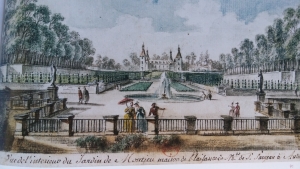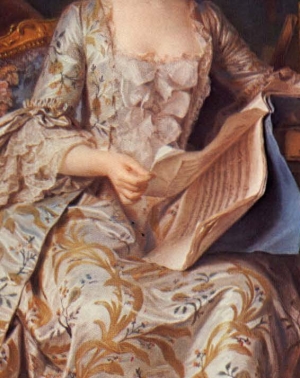Displaying items by tag: Emilie & Voltaire
Émilie du Châtelet 1738--Episode 3
Nicholas Gentile and I have written an opera about Émilie and Voltaire and were invited to speak about it to Sydney's Queen's Club. Episode 1 of the speech shows Émilie as a girl being shown off by her fond father as a prodigy in mathematics and natural science. With the approbation of her mother, she also excelled at the harpsichord. Episode 2 introduces Voltaire, on the same evening at the Breteuils’ Château de Preuilly in the Loire Valley. Here in Episode 3 they meet again, when Émilie is 27.
‘We are now at the royal opera house in Paris in 1733. It’s the first night of The Empire of Love and Voltaire has come along to applaud the librettist, Moncrif, who’s a friend of his. Émilie has come because she’s very fond of opera and goes often with one of her three best friends, who are all duchesses. When Voltaire and Émilie fall into conversation on that fateful night, Voltaire claims that he’s met her more than once before, through her late father, the receiver of the ambassadors at the court of Versailles, but Émilie denies ever having met Voltaire. Why is this? Possibly the social distance between them.
'A lot has happened over the last nineteen years. Émilie is married, to a gentleman of higher rank than her own, with no great wealth but considerable land, and she has been the Marquise du Châtelet since the age of nineteen, with privileges at Versailles, where she plays cards with the queen. The Marquis du Châtelet is the head of one of the eight great families of the Lorraine and his family heritage is with the army: he is colonel of an infantry regiment in the Rhineland. The marquis is kind and considerate, and although his own pursuits are utterly different from Émilie’s, he respects her learning and her determination to make progress in physics. She has repaid him impeccably by giving him children and comporting herself as befits their high station: that is, with dignity and discretion.
'What has Voltaire been doing over the last nineteen years? Well, he’s a best-selling playwright, he’s made a vast fortune in various kinds of business, almost all the philosophical books he’s published have been declared illegal, he’s been thrown into prison more than once, and the government has only just let him come back from three years’ exile in England. He’s arguably the funniest and most entertaining man in France, and altogether a dangerous person to know.
'But from the moment they start talking to each other, the love affair is inevitable. The beautiful Émilie is both passionate and impulsive, and Voltaire equals her in energy and eloquence. He is very generous: amongst his gifts to her—along with all the diamonds and sapphires and scientific instruments—are expensive lessons in mathematics from the famous geometer, Pierre-Louis de Maupertuis, who becomes a close friend.
'From the moment they begin the love affair, disaster is inevitable. Except for hearts and minds, this is a mismatch of incendiary proportions. Amongst the top echelons in the French monarchy, people are supposed to conduct liaisons at their own level and in strict secrecy—but Voltaire is bourgeois, and infamous, and his every move gives rise to scandal.
'Lovers are never supposed to be seen together in public, but in 1734 Émilie and Voltaire both appear at the wedding of a close friend, the Duc de Richelieu. The celebration is far off in Burgundy at the Château of Montjeu (pictured) and Émilie has her husband’s permission to attend. Nonetheless, it ends in tears: another friend in Paris sends them a warning that there is a warrant out for Voltaire’s arrest over a banned book, and the king has dispatched gendarmes to Burgundy to throw him in prison once again.
'Voltaire is frantic to get across the border to Switzerland or the Lorraine but Émilie is terrified she’ll never see him again. She persuades him to go to a Châtelet property in the Champagne province, and hide there incognito while she goes back to Paris and Versailles to beg for his freedom. His hideaway will be rarely used hunting lodge, well off the beaten track in the valley of the Upper Marne, named Cirey.’
From Facebook to facing books
I'm bowing out of Facebook and inviting readers to rediscover this website, so I'll be posting here more frequently from now on. My presence on social media and here was intended to bring people closer to my writing. And my principle project at the moment is the opera I've written with Nicholas Gentile, the first ever to be created specifically for the screen. So from now on the main topics on this blog will be Émilie du Chatelet, the film project Émilie & Voltaire, and my own writing, in that order.
After decades devoted to writing, I now recognise that Émilie & Voltaire brings to fruition something that I was searching for in 2011. Back then I conducted a secret interview with myself. Looking at it again today for the very first time, I realise that something I yearned for then has come into being, and it turns out not to be a novel but an opera libretto! Thanks to Nicholas and our film team, it will soon go out into the world. Here is my self-interrogation from 12 years ago, unedited.
Why do I write?
Because I’ve always liked to read stories and wanted to work that magic, of keeping someone enthralled when they’re curled up with a book. This is an old dream of mine. For the last two decades it’s been a drive, not very examined.
If it’s for a definable purpose, am I achieving that purpose?
Possibly there’s a purpose there, as I grow older, of telling something about the world of human beings, what they’ve done and what moves them. I don’t write from any psychology or sociology of history, though, and I don’t see any point in a catalogue of facts. Some readers looking for romance in my books find too many facts; others find the stories rich and dramatic. I don’t think I’ll ever know whether the purpose is being achieved. I should spend some time thinking about whether I have one, however.
Am I doing it more for me or for others?
The drive is deep so I guess it’s primarily for me. About me, though? Don’t think so.
Is it meant to have an effect on others’ lives?
I do want the reader to share my fascination with the events I touch on, so it’s partially an adventurous history lesson. And I want the characters to become part of the reader’s life for a while, to be believed in as complex creatures. Capable of surprising and disappointing. Capable of inspiration. The books are full of moral choices.
What sort of effect does it have now?
Varied. Some people cry when they read the books, usually in odd places. Fiona Henderson, my first publisher, cried when the Master died in La Créole. Nerrilee Weir, rights manager, dreamed of Jules from Rebel. The history grabs some people. Do my books make people think or change their view of the world? I’ve no idea.
What am I trying to express?
That we love. That as a species we keep love out of most of our dealings with others. That we can’t concentrate long enough on examining what we do. That our mistakes are monumental. That in our hearts we know what’s wrong.
Is my writing honest?
It uses story constructs hallowed by literary practice. If it were totally honest, perhaps it would be less planned, stranger. But maybe less powerful?
Does it reflect my deepest preoccupations?
Who knows? Deep preoccupations tend to stay down there, inside us, rarely recognised. So there’s no real answer to that question.
Is there any point in going on?
In the sense that writing is a discovery, yes.
If there is, what kind of writing do I want to do?
I want people to sit up and take notice of it. Why? I’m getting older and I still haven’t written a book that reaches out and moves a lot of people powerfully. I have a desire to do that. But until I find out why I have that desire, I’ll never write the book. I know it’s not basically a selfish impulse, but beyond that I’m not sure where it comes from or where it’s going.
Is writing my greatest talent, supposing I have any?
Yeah, for what it’s worth. Not much. Good enough perhaps if given free rein.
Would I achieve the (supposed) purpose better by another means?
No, not that I know of.
Is it a search for something?
Looks like it.


